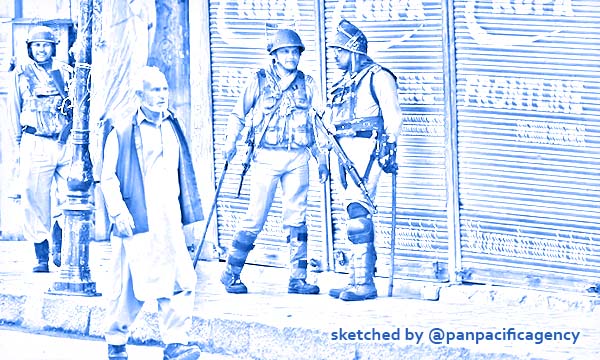Kashmir can’t be removed from UN agenda: Pakistan

A man walks past Indian security personnel on a street in the Lal Chowk area of Srinagar on August 20, 2019. Photo: AFP / Punit Paranjpe. Sketched by the Pan Pacific Agency.
UN, Sep 5, 2020, Dawn. Pakistan reminded India on Friday that Kashmir cannot be removed from the agenda of the UN Security Council (UNSC), which was committed to resolving the issue according to the wishes of the Kashmiri people, Dawn reported.
“Indian representatives are either deluding themselves, or deluding their public, by asserting that they will remove Kashmir from the Security Council’s agenda,” said Munir Akram, Pakistan’s permanent representative to the United Nations, while commenting on the Indian move.
“It will not happen”, he said.
Ambassador Akram argued that the Security Council’s agenda was set in accordance with the established rules and procedures and could be changed only by a consensus decision of the council. “A member state cannot change the agenda unilaterally.”
India asked the UN body earlier this week to remove Kashmir from its agenda to prevent Pakistan from raising it at the 75th session of the UN General Assembly, which begins in New York later this month.
India has asked the UN Security Council to take the dispute off its agenda
In its statement on the Report of the Security Council for 2019, India complained that Pakistan “keeps pushing for discussions on an outdated agenda item in the council” which for “all matter needs to be removed from the council’s agenda permanently”.
Since Aug 5, 2019, when India illegally merged the disputed territory with it, Pakistan has raised the Kashmir issue three times inside the council with China’s support.
The Indians, however, argue that the merger — although illegal — has ended the disputed nature of occupied Kashmir and therefore it should be removed from the council’s agenda.
The UNSC does not recognise the Indian claim and not only treats occupied Kashmir as an unresolved dispute but also maintains military observers on both sides of the Line of Control (LoC). Every year, the council puts occupied Kashmir on its agenda as “the India-Pakistan Question”, making it clear that it sees it as a territory disputed between the two countries.
Diplomatic sources at the UN headquarters in New York told Dawn that India has long sought to remove the “India-Pakistan Question” from the agenda of the Security Council. Despite its best efforts, India’s attempts have failed consistently.
Describing the Indian claim as “outlandish”, one UN diplomat said an agenda item could only be closed if a dispute was settled or “there is a consensus decision” of the Security Council to remove it from its agenda.
“This is obviously not true in the case of the Jammu and Kashmir dispute,” the diplomat added.
“It is a pity that a country which is so eager to join the council is not even aware of the basic rules of procedure governing its functions,” said another diplomat.
The Security Council, as a primary organ of the United Nations, is entrusted with the responsibility of maintaining international peace and security, which requires it to keep a list of items on its agenda. No item can be removed from the agenda if even one UN member state requests it’s retention.
Pakistan annually requests retention of the agenda item called “the India-Pakistan Question” under which the Jammu and Kashmir issue has been discussed since 1948.
The item was first inscribed on the agenda of the Security Council in its formal meeting on Jan 20, 1948 and since then the council has adopted 16 resolutions on Jammu and Kashmir.
Paragraph 72 of the Security Council’s annual report to the General Assembly on its work during 2019 records that following India’s illegal actions of Aug 5 the Security Council considered the situation in Jammu and Kashmir on Aug 16 under the item “India-Pakistan Question”.
Several letters addressed to the president of the Security Council last year and in 2020 have all been officially circulated under the same item. The mandate of the United Nations Military Observer Group in India and Pakistan (UNMOGIP) was authorised by a decision of the Security Council under the same agenda item.
UNMOGIP remains stationed in Jammu and Kashmir, another affirmation that the Kashmir dispute remains on the agenda of the Security Council.
The group regularly monitors and reports the ceasefire violations along the LoC in Jammu and Kashmir, allowing the council to remain seized of the developments there.
“The UN Military Observers are stationed in Kashmir and ceasefire violations are reported daily to the UNHQ and to the Security Council; this is proof that this dispute remains under the active consideration of the Security Council and is in no way outdated,” Ambassador Akram said.